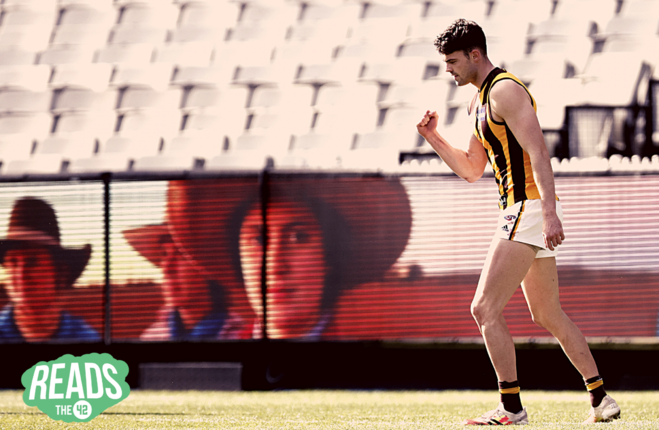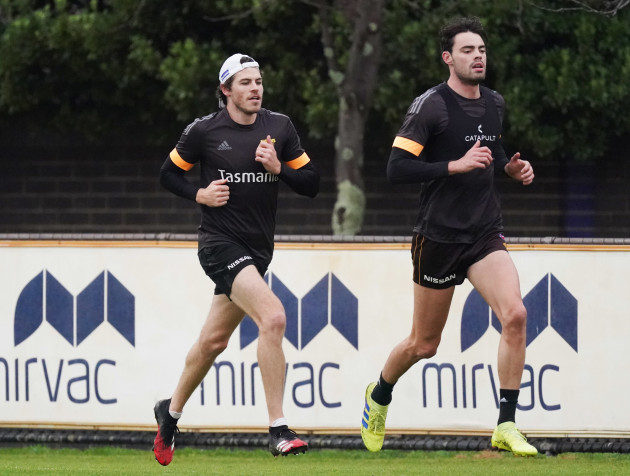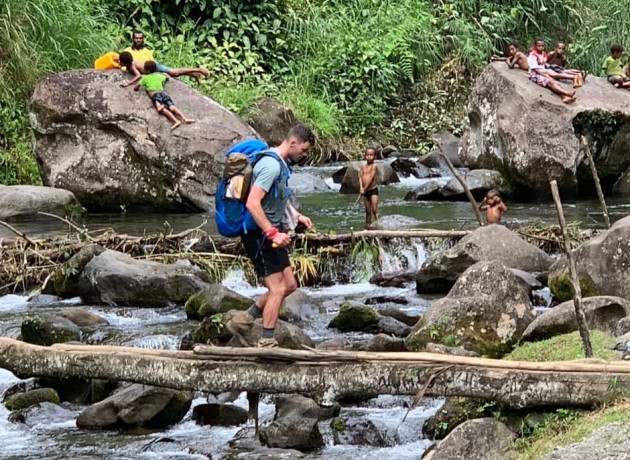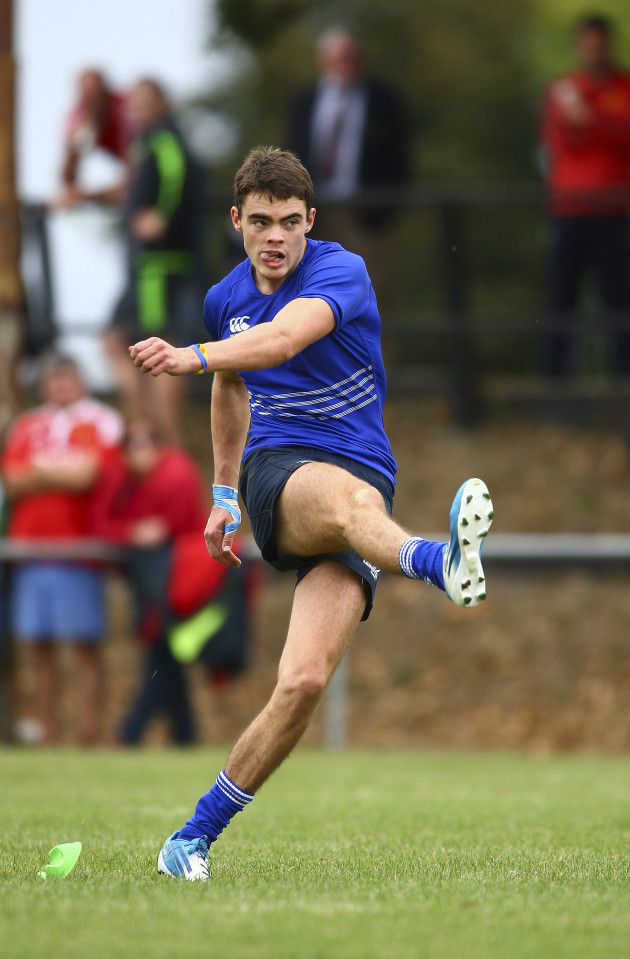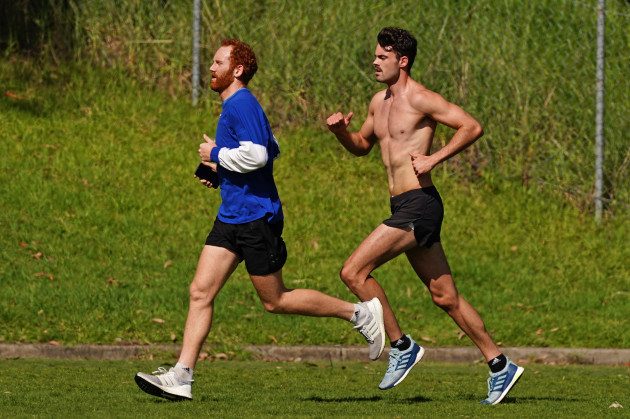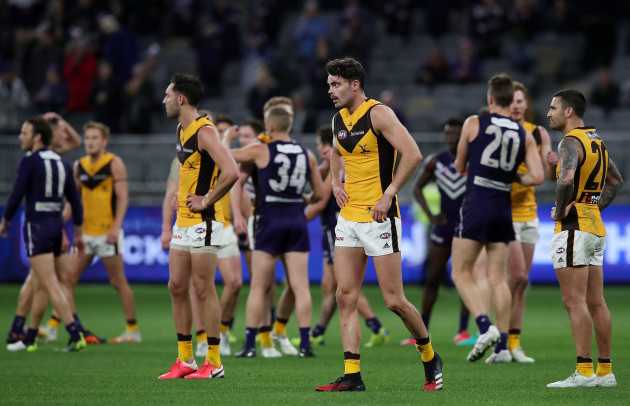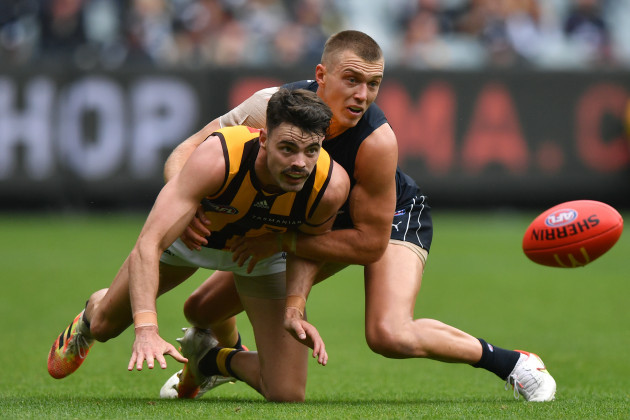IN A PLACE called Mooloolaba on the Sunshine Coast, Conor Nash hit rock bottom. He was empty. He had nothing left.
As an 18-year-old, Nash had his pick of sporting pursuits. Leinster rugby wanted him. Meath’s footballers needed him. But a three-year courtship by AFL giants Hawthorn came to a head in 2016 when he signed a two-year contract.
During Melbourne’s various lockdowns last year, Hawthorn’s old ground Glenferrie Oval was within his travel limits. He walked that ground and stood under the shadow of a crumbling stand. The club’s first base was here, he explained. When Nash first joined the club he lived with a host family, the Kings. Their home was right around the corner. They were club members, lifelong fans and taught him all about the Hawks’ storied past.
He pointed to the far bank, beneath a local train line and described a packed hill as crowds flocked to their beloved oval. Prior to that, they had a nomadic history. Playing home games wherever the most suitable, and attainable, ground was. In 2006 they moved to Waverly Park.
Another relocation is in the works. They’ve planned the new training complex for years. Visited Premier League clubs for inspiration, carved out 80 acres, he excitedly explained, before mellowing.
“Hopefully, I’ll be around to see it…”
Kids who’ve been cooped up for far too long and parents who are all too grateful to get outdoors practised kicking ‘torps’ on the field. Nash watched on impulsively. With one eye on a symbol of Hawthorn’s past glory and the other looking anxiously towards the future, he continued to chart the club’s rise. And his own.
- See sport differently with The42 Membership and get closer to the stories that matter with exclusive analysis, insight and debate. Click here to find out more>
The first preseason was brutal. Best exemplified by that day on a Queensland beach.
“That camp was scary stuff,” he recalled. “You get two days off before the last day, building up to it.
“It is three hours, a ridiculous session. Finish for two hours and back at it again. By that time, I had done all the training. 95% of the preseason, which is rare for a rookie. I went home at Christmas and Mam and Dad got some shock. ‘What the hell happened to you?’ I lost so much weight in those seven weeks.”
From 95kg to 88kg. In hindsight, it was too much load too soon. Four games into his debut year his hamstring tendon tore.
But he wanted the work. To delve deeper and see how far he could go. Where was the brink? What happens when you reach it? That day he found out.
“It was in the blistering sun, straight off the track and onto the bus. Drive-up a height to the beach. Then we start to run up the dunes. Up and down, up and down.
“Finally, we got to the last one, I tore off. I was flying. I got to the end, where the other runs stopped beforehand, the finish line for every other run. So, I pulled up and the boys started streaming past me. All the older lads knew what to do for the last one. It is way longer, a big stretch to finish.
“I physically couldn’t get going again. I was just gone. That was it. Physically drained. Could not get moving, barely above a walk. I finished dead last. Right over the edge. They respect that here. I got to a place where I was no longer able to move physically. Mentally I got myself there.”
They call that final run the lemon twister. Train on steep mountains so games feel like gentle hills. Turning red zones into blue zones. Preseason has a purpose. Posing specific questions. What are you about? What do we stand for?
In 2016 a group of first to fourth year players embarked on a gruelling nine-day trek along the Kokoda Track, a single-file foot thoroughfare that runs 96 kilometres overland through the Owen Stanley Range in Papua New Guinea.
It is home to one of the most significant battles in Australian war-time history. Inscribed on black granite pillars at the Isurava Memorial there are four values: courage, endurance, mateship and sacrifice. The same four values are enshrined in the club’s gym.
Nash was born with an embarrassment of physical riches — power, vision, size, speed. Growing up he played anything and everything. Athletics. Hurling. Soccer. Mainly Gaelic football and rugby.
When he was young, Ivanhoe Grammar school sent a team from Melbourne to Meath. Two of them lived with Nash and gave him a present of a Collingwood AFL jersey. That was the first time the sport came across his radar. The local sentiment when Nash departed was the same one that has been conveyed for decades every time a talent departs Down Under. Wish him well. Wish he wasn’t going. What a Royal loss.
And yet he was never the footballers’ to lose. Leinster were the real competitor. He played club rugby for Navan although growing up the son of a Newcastle West native, Munster were the childhood team. Ronan O’Gara his hero.
Nash joined Leinster U18s and in his second year became captain of a class that included Ciaran Frawley, Paul Boyle and Sean O’Brien. When he had an Australian rules contract in his hand, Leinster brought him to a game in the RDS to sit down with Guy Easterby and Leo Cullen. It was a tantalisingly offer, truth be told.
They sent him off with well wishes. He left on good terms. The province kept in touch.
Hawthorn had invested from the offset. Someone was there watching when St. Pats played a juvenile final against Good Counsel in Dr Cullen Park. Nash was 14, in midfield marking Kilkenny native Darragh Joyce, now a key defender with St Kilda.
They kept calling after his father hung up. An AFL club ringing about his son? Surely a prank call.
They employed former Longford star and former Essendon player Mickey Quinn for monthly pitch sessions prior to the move. They sent information packs and bags of gear. They flew his family out to show them around the facility.
The Irish player’s psyche in the AFL is a unique one. This is a professional sport. Yet they were raised with a one-club, one-county mentality. As such they carry with them a deep-rooted, and occasionally counterproductive, loyalty. Turning down interest from elsewhere because of a deep allegiance with the outfit that afforded them an opportunity. Missing out on improved terms or guaranteed games as a result.
Even taking all of that into consideration, Nash’s affection for the Hawks is still striking. This is his tribe. He swears by the club.
“They are big on culture here,” he says, speaking over Zoom earlier this week.
“They back up those words with action too. Each coach has a different philosophy, they come and go, but the club itself stands apart. Hawthorn wants to be known for looking after its people. With an Irish player, they go the extra mile.
“That is a good lesson for others. You are bringing someone from the other side of the world. Whether it is starting to prepare them from a younger age or doing the legwork, it is just about giving them every chance of being a success. Flights, doing the right thing by them. Include that in the contract.
“Arranging host families rather than ad-hoc stuff. This thing of three or four new draftees, ‘sure throw them together.’ That’s wrong. Here they actually have a structure. Getting two Irishman alongside each other. I had that with Conor (Glass). Now Fionn (O’Hara) has come across.”
They learned the hard way. In 2013 Hawthorn signed a Dublin U21 All-Ireland winner. Ciaran Kilkenny arrived and excelled during preseason. He came over in November, trained well and went home for Christmas. They never saw him again. Somehow, somewhere, it fell through the cracks.
Since then, the AFL giants have operated outside of the conventional combine system and relied on their own network. Developing a relationship over years to ensure everyone is on the same page.
Nash does it differently too. Rather than following in the footsteps of previous converts, he elected to find his own player-manager.
It was July 2021 in a bustling Hawthorn Café when Peter Lenton stopped by and asked how he felt. He told him he was all good. No, really. All good.
“My manager has been fabulous for me,” he explained after they bid farewell.
“I think that is very important. There are good and bad managers. Agents. Not only financially, just helping different things. Car licences, visas, taxes, he really helps.
“I just like the personal aspect. Not part of a big corporation. He has his 20, 25 players that he works with.”
At this particular point, Nash was in the midst of the toughest period of his career. In hindsight a brief blip in an undeniable success story. He made his debut in 2018 and played five games that season. It was a sudden rise.
His mind drifted back, like a midfielder under a floated kick-out. He can see the beginning. The first stirrings, the pride at finally playing AFL footy. It started a year previous with an almighty initial celebration. Only it was not for his debut.
From day one, Nash lived with Derry native Conor Glass. The Maghera captain was a MacRory Cup schools sensation. They were housed and reared together. In 2017 Glass’s family paid a visit. He was in the car sightseeing when the phone rang. Nash was sitting in the passenger seat and answered the call.
It was Hawthorn’s legendary coach Alister Clarkson bearing good news. ‘Glass will debut this weekend.’ Nash was the one who broke the news to his primary ally. In the back seat, the Glass family celebrated exuberantly. Glass just did all he could to stop his hands from shaking and avoid an accident.
Nash wanted that thrill. A year later it arrived. Same deal. He was driving. His parents were in town, on the way back from a day out at the Peninsula Hot Thermal Springs. When the phone rang, he put it on speaker.
‘When are they flying home?’ Clarkson asked.
Tomorrow.
‘Could they delay it a few days? Their son is due to debut in the MCG this weekend.’
Another car eruption.
There’s an unfaltering evenness whenever you’re around Nash. Clear eyes, calm head, can’t lose. Team-mates describe him as a perfectionist. He has an abiding ability to make assessments without any emotion. When fellow Meathman Cian McBride was offered a contract with Essendon, it was Nash he turned to for advice.
That is another certainty of the Irish community in the AFL. They are a unit. The chances of a player being screwed over again are remote because they all know how a contract should look and what should be included. And they all consult one another.
What he says always materialises. Throughout various conversations in late 2020, Nash repeatedly stressed Glass would enjoy immense success upon his return home. “It is a certainty,” he declared more than once.
When reminded of those remarks this week, he nods knowingly. An Ulster medal was no surprise. He saw it coming.
“Conor is such a smart man. He has brought so much back. Whatever about his obvious football ability, his stuff off the field must be a huge benefit.
“Even boys who come out here for a year or two, I think counties at home can learn so much from them. Around culture and what do you want to stand for. I never remember Meath talking about that.
“What is your trademark or culture piece? What do you stand for? Conor was doing a bit when he was out here I know. A group from Derry came to visit at one stage.
“He’ll have brought back heaps of stuff. Even his high-performance experience. Little drills we do. The importance of ball work and learning your craft. Position-specific work. Different ways of training. Conor is all over that.”
As for Nash, his upward trajectory continued into 2019. The forward was afforded an extended run and the team were winning. He was playing and scoring. 14 games. Nine goals. The payoff after their extensive investment.
Then it stuttered. In 2020 Nash played just two games and the Hawks sunk to fourth from bottom. That slump continued into 2021. He was in for a game and out for several. Playing out of position in a losing side.
The Irishman became a lightning rod for supporters’ frustrations. The online criticism swelled. A prominent AFL journalist and leading Hawthorn fan took to Twitter to declare it time to end the Conor Nash experiment. In fact, she stressed, it ‘should have been ended a long time ago.’
Social media guarantees suck shock value takes. Context be damned.
In reality, the question was not how was he playing. Nash knew the answer better than most. At the time the club used a rating system. Every player assessed their own performance out of ten, the coaching ticket did similar. Then they were posted side by side for all to see.
The pandemic delayed the start of the 2020 season and Nash opted to stay in situ. The impact on every player was significant, even more so if they were already thousands of miles from home. When teams were placed in hubs, his partner was unable to travel with them. During the standdown period, he injured his medial ligament. Some of the scar tissue lingered.
On top of that, during a practice match against North Melbourne on their first weekend back, he was hit side on and dislocated his shoulder. Only he didn’t know it.
‘It is just a stinger,’ Nash told the physio. ‘It has happened plenty of times playing rugby.’ They ran a test and it seemed strong so taped it up and away he went.
That night it totally seized up. He slept with the arm tucked in tight to his body. Withdrawn in protective mood.
A scan subsequently discovered he had torn his anterior labrum and roughed up cartilage at the front of the shoulder. Damaged, but deemed not enough damage to operate on. The advice was to hold off on the shoulder reconstruction until after the season. So, he struggled through until then.
And he was playing as a key forward. Nash is many things and his versatility had proven invaluable this season, but that position does not suit his skillset. His game is about explosiveness, not artistry. Speed and size to hit and harry, not claim hangers in the sky.
He dropped down to the reserves and excelled in the midfield for Box Hill Hawks. Their coach then was Sam Mitchell. When Nash first visited Melbourne, Mitchell was a player at the club, sent to play keepie-uppies with a nervous guest.
In July of last year, Hawthorn were hit by a bombshell. Their form was poor, a long-term succession plan went to pieces and it was announced after 16 years, four-time premiership-winning coach Alastair Clarkson was leaving at the end of the season. Mitchell was set to take over.
For the final few games of 2021, Nash played in midfield. He was at home in the guts. Clarkson raved about his new role after the first deployment against Brisbane. Meanwhile, Mitchell kept hammering home his consistent message.
“The biggest thing he tells me is to be Irish. Play to your strengths, we don’t want you to be like all the Aussies. Just go out and kick around the corner if you need to. When the ball is in there it is like rugby. Trust your instincts.”
His internal game ratings went from a five to a seven. He closed out the season with back-to-back eights. In 2020, his average AFL Footywire score was 28. In 2022, he has played every game bar one this season and his score is almost 60. Hawthorn are currently 13th and competitive week on week.
Watching on from Derry was Glass. Their trust extends both ways. He knew it would come good.
“It is so easy to post and write comments when things aren’t going bad, even if you don’t know all the facts,’ Glass explained last month.
“Hawthorn weren’t going great at the time and Conor was being put into different positions. Conor is such a team player that he doesn’t go outside of his role to try… some players might not do their job and chase the ball looking for touches and stats. As Gaelic players, we didn’t know about that until we went out there.
“It is so stat-orientated. The best player on the pitch could have 15 disposals but the Brownlow goes to a person who had 40 touches, even if he shovelled it out to no one. Conor is such a team player. He won’t opt for that. He does his role for the good of the group. He is incredibly unselfish.”
Keep an eye on the tremendous effort by Nash. 👀#AFLHawksTigers pic.twitter.com/OurfZzhODF
— Hawthorn FC (@HawthornFC) May 14, 2022
For Nash, his main goal was to always stay level. Just as it is now.
“I came in as a key forward and it just didn’t go well,” he outlined when speaking this week.
“Then I went back to Box Hill, but I was still enjoying it. Genuinely. I know plenty must have thought, ‘fuck. He must be hating it over there.’
“Again, I go back to the club. I had great coaching and I had stuff off the field to enjoy. Uni and Melbourne life. I was still enjoying being out here. It can’t be all football focused. Things aren’t going well in football, so it affects life. It doesn’t work like that.
“I sat with Mitch halfway through the year and we said, ‘it is time to try something else.’ I had my contract so it wasn’t drastic, although Hawthorn could come to me and say look, ‘we want to leave you go.’ At the time it was jittery. They could have said it was over, but I kept an open mind with everything. All in, always.
“It just shows how quick this game can change. Stay the course is my big one. I say it to the boys now. Stay the course. Things can change so quickly. Either way. You can be high as a kite then a bad injury comes. Things are never as good or as bad as they say.
“Even after I finished the year well and thought, ‘right. I could really take off in midfield. It suits me better. I’ve found a slot.’ With everything going on there is still anxiety. It is always there.
“I spent three months at home before Christmas. I went home and Mitch said, ‘I don’t want to see you before Christmas. You haven’t been home in two years. Train with Fionn and see you in January. Enjoy your time.’ Again, that is a credit to the club’s understanding.
“Even still there was anxiety because I was at home, away from the group, not in Australia. I was still training hard but felt guilty. I always say it to the other Irish boys now, stay the course. Things aren’t as bad or as good as they seem. In this game, it changes so quickly.”
So, what’s next?
“I suppose when you are younger, you just want a game. Then it is the anxiety week on week. Am I playing? I am starting to move away from that. I am starting to learn if you think of the collective your individual game takes care of itself.
“I don’t want to move anywhere else! Mitch has put such faith in me and given me such an opportunity. He is a phenomenal coach. His mind… he is just a highly, highly intelligent man. He has opened our eyes this year. We are a young team on a journey. I want to be part of that.
“Right now, I am chatting to Hawthorn and hoping to get something done soon enough.”
No end in sight.
See sport differently with The42 Membership and get closer to the stories that matter with exclusive analysis, insight and debate. Click here to find out more>
